Courtesy of Irma McClaurin
‘The Pied Piper of Amherst:’ James Baldwin’s years at UMass and the Five Colleges
“Jimmy’s presence was really electrifying and beautiful"
February 28, 2021
James Baldwin spent much of his life being told he was too radical – too radical for white critics, too radical to speak at the March on Washington and too radical for the Ivy leagues – which did not concern him. He “found his kind,” at UMass, in the words of his then-personal assistant Dwight “Skip” Stackhouse.
Baldwin was fond of late night discussions with his colleagues from the Afro-American Studies department, drinking Johnny Walker Black Label and sharing stories until sunrise in the New Africa House. Baldwin, a night owl, would be wide awake while his colleagues were drifting off. His sleep schedule was so unique that his friends had a running joke that he existed in his own time zone, affectionately named “Jimmy Time.”
“It’d be three o’clock in the morning, people would be a fallin’ asleep, and he’d say, ‘does anyone want to call out for Pizza?’” said John Bracey, the then co-director of the African American studies department at UMass. “I’d say, ‘Jimmy it’s three o’clock in the morning, you can’t get no pizza at three o’clock in the morning in Amherst.’ And he’d say, ‘what kind of town is this?’”
The search for a slice at 3 a.m. was just one of the changes he had to navigate when he arrived in Amherst. By that time, the author was about to turn 60, four years away from his premature death from cancer in 1987. He spent a good part of his last years in Amherst, agreeing to teach at the Five Colleges in 1978, but not arriving until 1983. He remained in the Pioneer Valley until 1986 as professor and distinguished fellow at UMass’ Institute for Advanced Study in the Humanities. To most of his colleagues and friends in the Amherst area, he was known as ‘Jimmy.’
Baldwin’s professorship was groundbreaking, but not unprecedented.
UMass was unique in that it was one of the first predominantly white institutions to have a Black chancellor. Randolph W. Bromery was chancellor from 1971-1979, just four years before Baldwin came to the University to teach.
UMass also had a thriving Afro. Am. department by the mid-1970s, which was unusual for the time. “By my research on the matter, I would say that the UMass department was one of the first fully organized and administratively approved [Afro. Am.] departments,” said Amilcar Shabazz, a UMass professor of history and Africana studies. Because they were their own department – not just a pro gram – they were able to tenure their professors, creating a community.
“[UMass’ Afro. Am. department] was really building its particular focus around activism, and you can’t get more of a Black activist than James Baldwin,” said Dr. Irma McClaurin, bio-cultural anthropologist, activist and award-winning writer. McClaurin was working as an assistant dean at the UMass College of Arts and Sciences information and advising center while Baldwin was teaching.
“What you have happening at UMass is a number of things that have to happen for a radical like Baldwin to one, be invited, and two, be comfortable,” said McClaurin. “And you have this concentration of Black talent, which is both scholarly, the John Braceys and other folk, but also artistic.”
Three of the Afro. Am. department’s professors at the time, Ekwueme Thelwell, John Bracey Jr. and William Strickland, were civil rights activists. Thelwell and Strickland knew Baldwin while they had worked at the Student Nonviolent Coordinating Committee and the Northern Student Nonviolent Coordinating Committee, respectively.
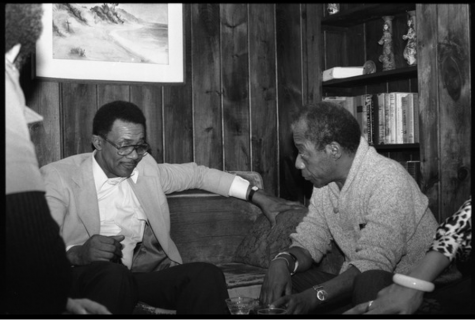
“When I first met Jimmy, he was much older than me by about 10 years … I was a student, he was an established writer. When he came back to Amherst, we were contemporaries,” Thelwell said.
After the ceremony where Baldwin received his honorary doctorate in 1978, some of the attendees gathered to talk with Baldwin at the house of Paul Puryear, a political scientist and former UMass provost. During the gathering, the idea of Baldwin teaching at the Five Colleges was brought up for the first time.
“Everybody’s sitting around you know, just kind of relaxing and talking and just having a good time,” Bracey said. “And then I forget who popped it up at first, but they said like, what are you doing? Why don’t you come hang with us for a while?”
Baldwin was finishing teaching a writing class at Bowling Green State University. “We said, well, ‘you know how much did you get for that,’ so we know how much to ask for,” Bracey said. “And he said they were paying him $5,000. It was dead silence, dead silence. We just stopped. And then Jimmy looked up and said, ‘did I say something wrong?’ I said, we can get you more than $5,000.”
The following day, Bracey called Pat Murphy, the then-Five Colleges coordinator. “And I told him a kind of story, but I don’t mind doing it for Jimmy,” Bracey said. “I said, ‘Pat, we gotta move fast, because we can get James Baldwin.’ I said, ‘he usually makes $100,000. But we can get him for 75. We gotta move because there’s all this competition for him,’ which there wasn’t, of course.”
Bracey’s story was successful. Within a day, all of the Five College presidents committed the money to bring Baldwin to the Colleges.
Given Baldwin’s prevalence in today’s academia, it seems impossible that he wasn’t overwhelmed with teaching opportunities. In the 1980s, however, Baldwin was seen as much more of a radical figure than he is remembered as today. Too radical, in fact, for the Ivy Leagues.
“The job we got him was the first real job he ever had,” Bracey said. “They all do the Baldwin Scholarships, but none of those schools offered him a job.”
Baldwin spoke at some of the Ivy Leagues, but he never taught at them. “Jimmy wasn’t bothered by it, he just thought it was stupid,” said Stackhouse. “Jimmy knew the difference between education and intellect.”
Yet sometimes, his audience didn’t. McClaurin referenced a scene from “I Am Not Your Negro,” a documentary about Baldwin’s work which takes place at Cambridge University in 1965 where he debated William Buckley. “Look at that audience…It’s all these white men. You can see that they want to challenge him, and he’s not going to back down.”
McClaurin connected the clip from Cambridge to Toni Morrison’s interview with Jana Wendt, an Australian reporter, where, in McClaurin’s words, Wendt asked, “‘When are you going to really write an American thing?’ meaning when are you going to write about white characters? And Toni Morrison says, ‘That’s racist.’ You know, you don’t have the right to tell me who I write about.”
“What America does is it takes one person, Martin Luther King, James Baldwin, it makes them the star and then it pretends that there’s no other talent out there. But there is. And I think Baldwin knew that,” McClaurin said.
Baldwin spent much of his life living outside of the United States in France and Istanbul.
“I think…he felt that the consequences for him [to speak and write about race] would be less than they would be for someone who was still living in the United States,” said McClaurin. “He had the financial ability to not be dependent upon what white people thought about his work or his words, you know, to take that risk, not everyone was in a position to do that. You know, because we’re working within these structures that are trying to sort of contain us.”
While Baldwin wasn’t concerned with the ivory tower or critics in academia, he was concerned with the opinions of his supporters. This concern came through when he was asked to do interviews. “If he had an interview, and there were many, many interviews, I would sort of have to drag him, kickin’ and screamin.’ And he would often get blitzed, you know, pitifully drunk,” said Stackhouse.
“More than once, the producer would say, ‘Look, Skip, we don’t want to embarrass Mr. Baldwin. He’s obviously in no state to conduct an interview,’ and I remember saying more than once, ‘Put the mic in front of him, and ask your questions,” Stackhouse recalled. “And he would regale with his wisdom, his vocabulary, his points of view.”
Baldwin would drink before his interviews not because he disliked them, but because of the pressure.
“When I say Jimmy was a humble man, he really was. And there was a level of him that didn’t understand all the attention that he was getting, and so he got nervous at the prospect of disappointing his fans, if you will,” said Stackhouse. “It unnerved him to have to be James Baldwin. He was very comfortable being Jimmy. But the legend of James Baldwin was sometimes too heavy for him to bear, so he would drink to calm his nerves.”
Several professors established a committee to plan out his time in the Pioneer Valley. The first Five College course that he taught was a writing course at Hampshire College. Working on his second-to-last long form essay, “The Evidence of Things Not Seen” on the Atlanta child murders, Baldwin was living on Hampshire College’s campus, where, according to Ernest Allen, “he would wr ite, you know, early, very, very early in the morning.” Hampshire College students realized that Baldwin was awake in the early morning, “and they started knocking on his door, you know, it’s like two o’clock in the morning. He said, at one point…you got to get me out of here.”
“He loved being around people…but he also was protective of his time,” Allen said.
Baldwin quickly connected with the students and staff alike. The first class he taught at UMass, a course on the Civil Rights movement, had so many students sign up for it that it had to be held in Mahar Auditorium in order to fit everyone.
“We didn’t want to turn out any students, we didn’t want to say, only students who are Afro. Am. majors, or only students who are tall, or only students who are short, or only Black students, we didn’t want to do that to anybody,” said Esther Terry, who was a teaching assistant for the course. “And I don’t think James Baldwin, in his world philosophy, would have allowed us to do that.”
The class was organized, and students would gather on Tuesdays to hear Baldwin lecture. The class would then break up into smaller groups on Thursdays, where the TAs would lead discussions around the material that Baldwin spoke about. While different members of the UMass Afro. Am. department led several discussions at UMass, additional discussions took place at other colleges in the surrounding area. Amherst College English Professor Kim Townsend led discussions for Amherst College students, as well as separate ones for students attending Hampshire College, Mount Holyoke College and Smith College.
This material was subject to change. “Jimmy, he didn’t prepare lectures, he wasn’t doing research, he was just full of…warm spirits and intelligence and courage. And my recommendation is you go back to the essays again and again,” Townsend said. He simply spoke about what was striking him at that specific moment.
“Driving over, I would ask him, like, you know, ‘What are you going to talk about today,’ and he would say, ‘Well I’m thinking about it.’ And the first time I was in total panic, like, ‘Oh jeez, what is he gonna say,’” said Bracey.
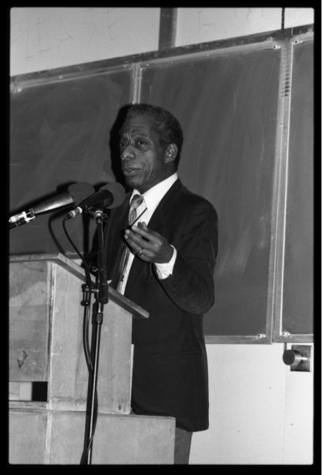
His courses did have syllabi, but they weren’t always representative of the course. “You didn’t go in with the syllabus saying, today we discuss X, Y and Z,” said Terry.
“You don’t say to a person like James Baldwin you have to follow the course outline. Of course you don’t,” said Allen, who also served as a TA for Baldwin.
Despite Baldwin’s spontaneity, his lectures were always successful. “He’d walk in, completely extemporaneously and give beautiful lectures, just completely, completely shaken and coherent, as if he had been working on it for like a year,” Bracey said.
Bracey believed that Baldwin’s ability to give these unconstrained lectures was connected to the time spent as a preacher in a Pentecostal church when he was young. “That’s what ministers can do,” he said.
“That particular format seemed to drive some groups, small, small numbers of students kind of crazy…they’re trying to find this continuity that tended to exist, you know, in most, university courses with a fixed set of readings, and that sort of thing,” Allen recalled. “On the other hand, there were students who just loved the spontaneity of the courses, you know, it, you know, their, their idea was, it doesn’t matter what Baldwin talks about, it’s going to be wonderful.”
Students were so drawn to Baldwin that they would line up outside his office in the New Africa House during his office hours. The first time Baldwin saw this line, he did not realize that they were waiting for him. “He looked at them and he jumped into my office and said, ‘John is there some kind of demonstration? There’s a lot of people out there in the hallway,’” said Bracey.
Baldwin, never having held office hours before, asked Bracey for advice. Bracey told Baldwin, “They don’t actually want you to do anything, they just wanna be around you. So what you do is, they’re gonna say something, and you just nod your head and say ‘yes, a-huh, a-huh, a-huh,’ and if they have a problem, you say ‘I’m sure you’ll work it out,’ and you give ‘em a big hug, and that’s all you have to do.”
Bracey continued, “Jimmy said, ‘this is kinda like being a preacher, huh?’ I said, ‘well in a lot of ways, yeah.’”
Baldwin did not leave until he had met with every student who was in line. His office hours were supposed to be from 1-4 p.m., but sometimes he would be there until 7 p.m. or 8 p.m. “He was like the pied piper of Amherst, people followed him all over the place,” said Thelwell.
Baldwin, too, paid attention to his students, “especially any student who he saw that might be going through difficulty,” said Thelwell. “He had, Jimmy did, a difficult childhood, adjusting to his own growing sexuality as he learned about it…to his relationship to his father and to…his relationship in the community as a funny looking kid.”
Baldwin’s liveliness extended beyond his lecture hall and dinners with friends to the production of one of his plays, “The Blues for Mister Charlie.”
The play was performed at Amherst College’s Converse Hall in 1984 after being performed on Broadway. Baldwin worked closely with the director, Roberta Uno. “He talked a lot about how important that play was, to him, that, you know, why it’s called ‘Blues for Mister Charlie,’” said Uno. “People always looked at Black people as the victims, and that ultimately, it’s about what white people have sacrificed to be white in terms of a white supremacist construct, you know, the humanity that one has to give up. His wanting to kind of shift that idea of really looking at, right, who’s blues are these really, who should who should be lamenting.”
Baldwin was invested in the play. He came to every practice, where he would watch and take detailed notes. Though, this ended up being somewhat of a thorn, for according to Bracey, “no one could cut Jimmy’s words when he was at the rehearsals… He was hard to edit, he was invested in every single syllable.” As a result, the play ended up being extremely long with two intermissions.
“One of his frustrations was, how do you make history like that relevant to today? In this post George Floyd moment… when the entire country has experienced a racial reckoning to, to some degree… We can make those connections really easily now… At that time, you know, it was sort of like, oh, it is a civil rights movement. History,” Uno drew the parallel of, “it’s kind of like when Obama got elected and people [said,] ‘Oh, we don’t have a race problem, we have a Black president .’”
In order to emphasize the relevance of the issues presented in the play, Uno and Baldwin decided to mandate that Black people and white people sit on opposite sides of the theatre, which had two entrances. This decision demonstrated the racial tension that was still present. “The drama really started in the lobby, there were scenes that were so poignant.”
The University threw Baldwin a 60th birthday party, which was termed by Nummo News’ “A Tribute to a Living Legend.” Nummo News was UMass’ Black student-run newspaper at the time.
The party was held on the first floor of the Campus Center and was attended by UMass community members, Baldwin’s family and distinguished Black intellectuals, such as Maya Angelou and Lerone Bennett Jr. who both gave speeches in Baldwin’s honor.
“James has helped to lead us up the rough side of the mountain. We will always be grateful to James Baldwin,” said Angelou, who was quoted in Nummo News.
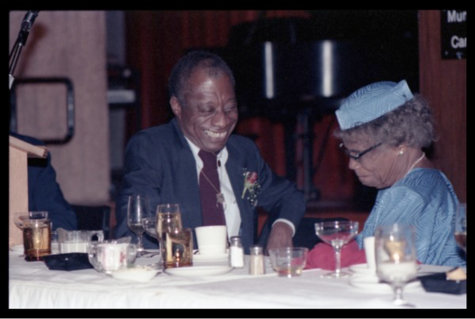
It was announced at the celebration that Baldwin would enter into a contract with the Five Colleges, expecting him to teach one year and take the other year off to write. “He wanted time to be away from the University and engage in his writing,” Allen said.
Though the full potential of this professorship remained unrealized, Baldwin taught from 1985-1986, returning to France
following the end of the spring semester in 1986, where he succumbed to cancer months later. After his death, UMass hosted a memorial service for him with speeches by many of the Afro. Am. faculty whom he’d befriended.
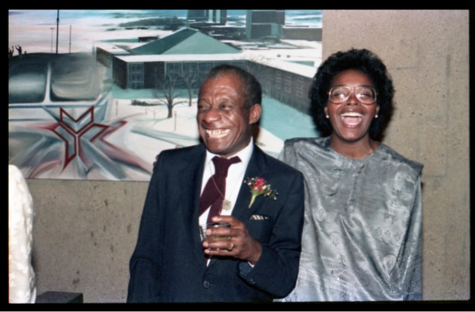
Baldwin’s legacy continues to influence the UMass community, Massachusetts and the U.S. itself. According to Jimmy Worthy II, an English professor at UMass, “James Baldwin’s voice continues to animate our most fervent grievances and amplify our fondest hopes. Through his creative impulses and penetrative analysis, Baldwin’s words expose us, as they demand resolution to our inner and national contradictions.”
“Such potent words capture and sifts American racist rituals, so that we might observe clearly in the rocky kernels that remain divided from pretense, its stubborn edges and its desire to cling to who we take ourselves to be. This is the sustaining spirit James Baldwin left us, and it is the legacy that profoundly informs the University of Massachusetts Amherst.”
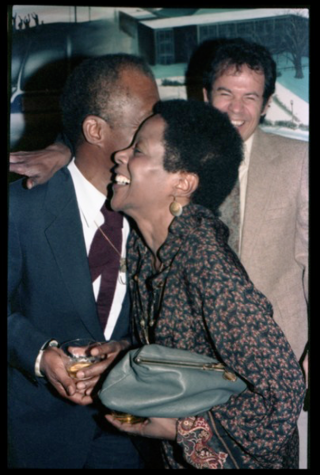
Baldwin continued writing, often collaborating with Five College faculty throughout. The last thing he ever had published was an introduction to Thelwell’s book of essays, “Duties, Pleasures, and Conflicts.” Baldwin offered to write it. “I never would ask him any professional favors, at this point he was not well, he was very sick . . . when he went back to France, he was supposed to come back to start the next semester, and he never made it back,” Thelwell said.
Baldwin didn’t have the introduction ready by Thelwell’s original deadline. When Baldwin finally gave it to him, it was full of whited-out sentences and sentences that had been crossed out and rewritten. “You could see that it’d taken him, maybe more than a month to write, because his health was failing. But he said he was going to do it, he volunteered to do it and he came through.”
Baldwin’s legacy looked different depending on who you spoke to. Some remember him as the literary giant, James Baldwin, while others who knew him also remember Jimmy.
One night in 1983, Bracey invited Baldwin to come share dinner with his family at their home in Echo Hill. Baldwin was driving up from New York and he was chronically late, so he arrived a few hours after they’d originally planned.
“Jimmy walks in, and he just walks right past all of the grown-up people,” said Bracey. Baldwin immediately sat down on the floor between Bracey’s two sons, who were watching cartoons. “Within a couple of minutes, they are all laughing hilariously,” said Bracey. When the dinner was ready, Bracey tapped Baldwin on the shoulder to let him know it was time to eat. “And he looked at my two sons and said, ‘Ah I’m sorry, I gotta go be James Baldwin.’”
“When he passed, I tried to explain to my kids, I said, ‘You know who he was right?’ And they said, ‘Yeah, he’s the guy who came and made us laugh,’” said Bracey. “And that was who he was.”
Sophia Gardner can be reached at [email protected]. Follow her on Twitter @sophieegardnerr.
Talia Heisey can be reached at [email protected]. Follow them on Twitter @HeiseyTalia.
Editor’s note: We wish to thank UMass Distinguished alumna, Irma McClaurin ‘76G ‘93G, Founder of the “Irma McClaurin Black Feminist Archive,” located in the UMass Special Collections and University Archives, for permission to use photos from her collection. The photos used in this article are under copyright.
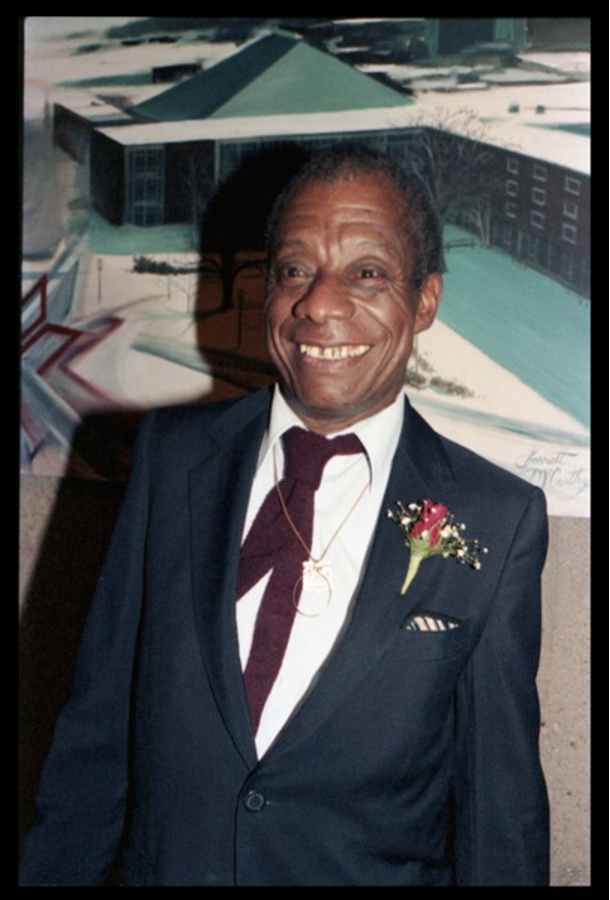
Thomas Egan • Nov 8, 2021 at 10:55 am
I was a 20yo undergraduate at UMASS, in 1983, when I met “Jim”…when I was working as a waiter at Delano’s Restaurant in Amherst. I was on my own…my parents had both just died unexpectedly…and I sorta ‘kept my head down’…just getting-thru. He asked me once why my hands were all ‘marked-up’ and I told him I did small construction/handyman-jobs to make ends meet. He asked me if I could build bookshelves in his home…he had tons of books. So, I did. From there…my work for Jim went on & on. We talked a lot, as I worked. A LOT, lol. Well, lo-and-behold…we became friends. “Just two guys, with a lot in common”, he used to say. I remember the first time he paid me, for the first round of work. My bill was $50…a huge amount for a broke young guy. He handed me $150. I said “what??”. He replied “you earned it, my friend”. Jim was my long-ago friend, indeed. ❤️
Allison V Fine • Mar 8, 2021 at 5:31 pm
One beautiful, brilliant and superior soul who’s presence is with us and also missed by us. If he were here today he would inform us, with his characteristic scathing honesty, just what he thinks about police brutality, our current racial violence against people of color and everything else that ails us. Black Lives matter and James Baldwin will always matter.
Cynt • Mar 7, 2021 at 8:58 am
This Part! God strategily places us M in life for a purpose!
jules chametzky • Mar 6, 2021 at 11:20 am
Wonderful piece on Jimmy. Many other things to say about him and his influence. I was Director of IASH when we made him a Distinguished Fellow of the Institute, and I was present as the only white person when Jimmy first came to Amherst and attended a welcoming party at Esther and Gene Terry’s house. He was nervous about returning to the States, and fearing he would be dissed by a younger generation of Black writers and activists. But the group at the Terry’s welcoming party was so warm and inviting, singing together, holding him, including him, his nervouness gave way to his warm, beautiful wide smile. He was welcomed home! Then another occasion, when the English Dept was trying to recruit John Wideman, I drove him from the station–and when we passed Mahar, I said to John, Baldwin is giving his lecture on the Civil Rights movement there right now. John said let’s go there now! Afterwards he said “When someone says, so I said to Malcolm, and King said to me,” He gets my attention! Needless to say we got Wideman for the English Dept. Also, one time Baldwin and Thelwell and I were having a drink at the Campus Center (we had a bar there then)on Graduation Day, when an oviously working class Black family, a graduating daughter with them, passed by, when about ten feet away, the father turned around and said with wonder in his voice, “That’s James Baldwin!”. Thelwell then said, would that have happened to a white working class family recorgnizing ANY white novelist of the day? Quite unlikely. Jimmy was unique and wonderful. My wife Anne Halley and I attended his funeral at St John’s the Divine in N.Y, where there was a packed house of Black people, only a handful of whites, and none on stage, where Imamu Baraka gave an inspired eulogy, internalizing much of Baldwin’s style, The only white person on the stage was the French Consul General. And when the funeral casket moved down the aisle, led by a Priest with incense vapors, and follwed by his grieving family, the fact that Jimmy, great as he was , was only mortal, much grieved and missed by his family. Jules Chametzky, Professor Emeritus, UMass Amherst, where I taught for 46 years and helped found the Massachusetts Review, and the Faculty Union
Ágnes McCraven • Mar 6, 2021 at 7:36 am
I got two degrees from Umass but never knew he was here in this area. There should be much more recognition about him in the valley. Photos on campus a sculpture and info. Thank you for the post!
Eliav • Mar 5, 2021 at 11:30 pm
This was an exceptional article. Thanks so much for this. UMass alum and a Baldwin devotee, but hardly knew any of this rich history you shared. I’m really grateful. Thank you!
Ms. Hetty Startup • Mar 5, 2021 at 7:28 pm
Great article – thank you. It is nice to know I can walk where he walked….and hung out with students. His work is so current. ….relevant.
Jack Garvey • Mar 4, 2021 at 9:01 pm
I had no idea that he was at UMass and the Five Colleges. This is a completely new view of him. Here’s a review I just wrote and posted of Begin Again, the new book about him by Eddie Glaude:
https://buskersdelight.home.blog/2021/02/27/before-the-bell-clangs/
Wendy Wilson-Fall • Mar 4, 2021 at 2:08 pm
Wonderful article.
Ted Chambers • Mar 4, 2021 at 12:22 pm
Sophia Gardner and Talia Heisey,
This is a such an excellent article. Thanks for writing this.
Scott Bernat • Mar 4, 2021 at 7:51 am
James Baldwin will always be remembered as a true and compassionate legend. Your well written article keeps his life story alive in our hearts and minds.
Scott Bernat
UMass Amherst
’83 Journalism
Ken Reade • Mar 1, 2021 at 9:21 pm
Thank you so much Sophia and Talia for such a well written article. What an absolutely fantastic historical reminder for the UMass and 5 College community. Well done.